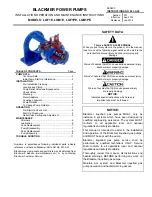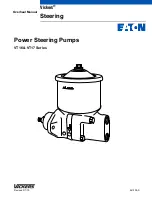
SF SERIES
OM-06511
MAINTENANCE AND REPAIR
PAGE E - 14
Rotor Shaft and Bearing Removal
(Figure E-2)
See
PUMP END DISASSEMBLY
, and remove all
pump end and seal components.
With the pump end disassembled and the seal cav
ity drained of oil, secure the pump in an inverted
position. Remove the hardware (12 and 13) secur
ing the intermediate (8) to the motor subassembly
(1).
Carefully pull the assembled intermediate, rotor
shaft (3) and bearings (2 and 5) out of the motor
housing until the female terminal (15) can be ac
cessed. Pull the female terminal off the male termi
nal (16) and remove the intermediate, rotor shaft
and bearings from the motor assembly. Remove
the O‐ring (6) from the intermediate shoulder.
If the moisture sensor (14) requires replacement,
unscrew it from the hole in the intermediate.
Remove the snap ring (4) from the groove in the in
termediate and pull the assembled rotor shaft and
bearings out of the intermediate.
To prevent damage during removal from
the shaft, it is recommended that bearings
be cleaned and inspected
in place
. It is
strongly
recommended that the bearings
be replaced
any
time the shaft and rotor
assembly is removed.
Before removing the bearings from the rotor shaft,
clean and inspect the bearings
in place
as follows.
Clean the bearings thoroughly in
fresh
cleaning
solvent. Dry the bearings with filtered compressed
air and coat with light oil.
Most cleaning solvents are toxic and
flammable. Use them only in a well ven
tilated area; free from excessive heat,
sparks, and flame. Read and follow all
precautions printed on solvent contain
ers.
Rotate the bearings by hand to check for rough
ness or binding. If rotation is rough, replace the
bearings.
The bearing tolerances provide a tight press fit on
to the shaft and a snug slip fit into the motor hous
ing and intermediate bearing bores. Replace the
shaft and rotor (as an assembly), the motor hous
ing or intermediate if the proper bearing fit is not
achieved.
If replacement is required, use a bearing puller to
remove the upper and lower bearings from the ro
tor shaft.
If no further disassembly is required, cover the mo
tor housing with a clean, lint free cloth to avoid con
tamination by dirt or other foreign material.
Stator Removal
(Figure E-2)
Stator replacement requires specialized
equipment, experience with electric mo
tors, and at least two people to perform the
task. Therefore, it is recommended that
stator replacement be performed only by
the factory or a Gorman‐Rupp Authorized
Submersible Repair Center, or that the mo
tor housing and stator be replaced as an
assembly (refer to the parts list, page E-5
for the appropriate part number).
Do not remove the stator (not shown) unless it is
defective (open windings, insulation resistance
low, or stator core damaged). If the stator must be
removed, position the motor housing upside down
on a flat work surface.
Position an expandable tool, such as a split disc,
approximately 2 inches (51 mm) down inside the
stator and expand it tightly and squarely on the I.D.
Attach a suitable lifting device to the lifting eye of
the tool, and raise the motor housing and stator as
sembly approximately 1 inch (25 mm) off the work
surface.








































